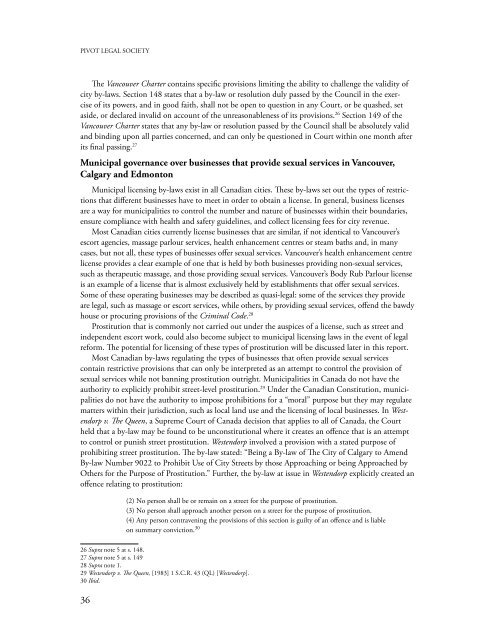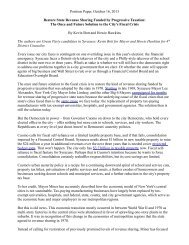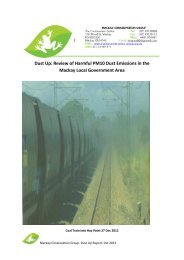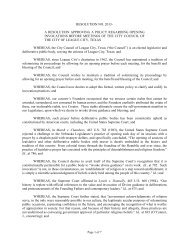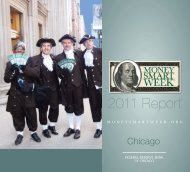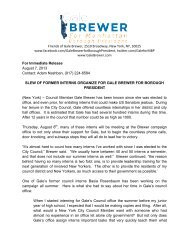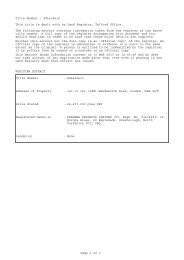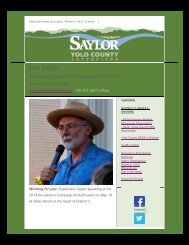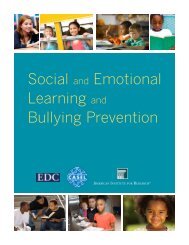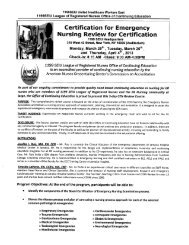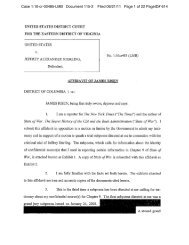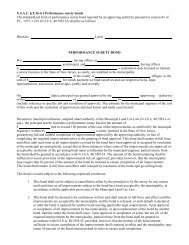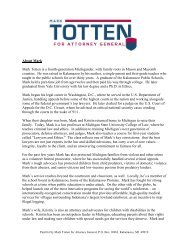Beyond Decriminalization: Sex-work, Human Rights and a New ...
Beyond Decriminalization: Sex-work, Human Rights and a New ...
Beyond Decriminalization: Sex-work, Human Rights and a New ...
- No tags were found...
You also want an ePaper? Increase the reach of your titles
YUMPU automatically turns print PDFs into web optimized ePapers that Google loves.
PIVOT LEGAL SOCIETYThe Vancouver Charter contains specific provisions limiting the ability to challenge the validity ofcity by-laws. Section 148 states that a by-law or resolution duly passed by the Council in the exerciseof its powers, <strong>and</strong> in good faith, shall not be open to question in any Court, or be quashed, setaside, or declared invalid on account of the unreasonableness of its provisions. 26 Section 149 of theVancouver Charter states that any by-law or resolution passed by the Council shall be absolutely valid<strong>and</strong> binding upon all parties concerned, <strong>and</strong> can only be questioned in Court within one month afterits final passing. 27Municipal governance over businesses that provide sexual services in Vancouver,Calgary <strong>and</strong> EdmontonMunicipal licensing by-laws exist in all Canadian cities. These by-laws set out the types of restrictionsthat different businesses have to meet in order to obtain a license. In general, business licensesare a way for municipalities to control the number <strong>and</strong> nature of businesses within their boundaries,ensure compliance with health <strong>and</strong> safety guidelines, <strong>and</strong> collect licensing fees for city revenue.Most Canadian cities currently license businesses that are similar, if not identical to Vancouver’sescort agencies, massage parlour services, health enhancement centres or steam baths <strong>and</strong>, in manycases, but not all, these types of businesses offer sexual services. Vancouver’s health enhancement centrelicense provides a clear example of one that is held by both businesses providing non-sexual services,such as therapeutic massage, <strong>and</strong> those providing sexual services. Vancouver’s Body Rub Parlour licenseis an example of a license that is almost exclusively held by establishments that offer sexual services.Some of these operating businesses may be described as quasi-legal: some of the services they provideare legal, such as massage or escort services, while others, by providing sexual services, offend the bawdyhouse or procuring provisions of the Criminal Code. 28Prostitution that is commonly not carried out under the auspices of a license, such as street <strong>and</strong>independent escort <strong>work</strong>, could also become subject to municipal licensing laws in the event of legalreform. The potential for licensing of these types of prostitution will be discussed later in this report.Most Canadian by-laws regulating the types of businesses that often provide sexual servicescontain restrictive provisions that can only be interpreted as an attempt to control the provision ofsexual services while not banning prostitution outright. Municipalities in Canada do not have theauthority to explicitly prohibit street-level prostitution. 29 Under the Canadian Constitution, municipalitiesdo not have the authority to impose prohibitions for a “moral” purpose but they may regulatematters within their jurisdiction, such as local l<strong>and</strong> use <strong>and</strong> the licensing of local businesses. In Westendorpv. The Queen, a Supreme Court of Canada decision that applies to all of Canada, the Courtheld that a by-law may be found to be unconstitutional where it creates an offence that is an attemptto control or punish street prostitution. Westendorp involved a provision with a stated purpose ofprohibiting street prostitution. The by-law stated: “Being a By-law of The City of Calgary to AmendBy-law Number 9022 to Prohibit Use of City Streets by those Approaching or being Approached byOthers for the Purpose of Prostitution.” Further, the by-law at issue in Westendorp explicitly created anoffence relating to prostitution:(2) No person shall be or remain on a street for the purpose of prostitution.(3) No person shall approach another person on a street for the purpose of prostitution.(4) Any person contravening the provisions of this section is guilty of an offence <strong>and</strong> is liableon summary conviction. 3026 Supra note 5 at s. 148.27 Supra note 5 at s. 14928 Supra note 1.29 Westendorp v. The Queen, [1983] 1 S.C.R. 43 (QL) [Westendorp].30 Ibid.36


